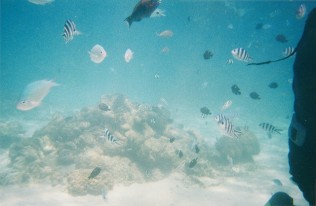
Mauritius may be young but it’s well known for being one of the developing world’s most successful democracies. It’s been featured on Ethical Traveler’s 2015 Ten Best Ethical Destinations, earning a place on the list for the fourth year in a row—and with good reason.
Eco-tourism has taken off in a big way in many places, including Mauritius. The government and the Mauritian Wildlife Foundation are advocates of sustainable tourism, promoting conservation that shows tourists more than just a strip of golden sand.
The Mauritian Wildlife Foundation has an objective to “promote eco-tourism, as a means to raise public awareness, generate income and employment and to contribute towards the sustainable development of Mauritius and Rodrigues.” There are many places you can see this objective in action. Black River Gorges National Park, the only national park in Mauritius, is one of them. It became protected in 1994 after scientists identified over 300 species of flowering plants, nine endemic species of bird and over 4000 giant fruit bats. It is an important habitat for three of the island’s most endangered bird species—the Mauritius kestrel, the echo parakeet and the pink pigeon.
Another key spot for eco-tourism is Ile Aux Aigrettes. It truly is a unique habitat. The Foundation is returning it to its former rich-green glory by recreating the state it was in before man came to Mauritius. The infrastructure for tourism was built utilizing existing buildings from World War II so as not to damage the area further; the paths and nature walks are set up to work with the landscape rather than against it and tours are given by experienced local guides. The aim is to raise awareness of the conservation work while simultaneously supporting it and creating local jobs.
In Trou aux Biches, its community-based coral-farming program has been praised. The Mauritius Oceanography Institute (MOI) records show that certain lagoon reefs have lost over 50-60% of their live coral cover in recent years, so to combat this and educate the community on the value of their reefs they teamed up with ELI Africa and the United Nations Development Programme’s Global Environment Facility (UNDP-GEF). A fixed rope coral nursery has been built and it nurtures coral fragments to rehabilitate the reef. ELI Africa hopes to use the project to help local residents and students to take ownership for the sustainability of the local marine ecosystem. It’s these reefs that have attracted experienced and novice divers alike to the island to dip under the surface of the crystal clear water; they’re certainly a tourist must-see.
It’s often described as a small world of its own: brilliant diving, to relaxed beaches, and mesmerizing flora and fauna. Mauritius allows you to cycle between destinations, hike in exotic forests and support the local industry while gazing at the rainbow reefs.
The Mauritius Marathon 2015 has been confirmed for July 19, which benefits NGOs Link To Life, which works to provide support and counsel to cancer patients and their families, and SOS Children’s Villages Mauritius. SOS Children’s Villages help build communities for abandoned and vulnerable children and young people in Mauritius, enabling them to live in an SOS Family, who provide support, love, care and fun the way a normal family would.
Wolfgang Slawish, Communications Director for the Mauritius Marathon, says that not only do they have one of the most beautiful race courses in the world but also the most personal approach to the marathon event. They care for the runners through the whole race process, being on-site at the runners’ hotel, having beneficiaries from the charities as a big part of the finish and organising post-race activities together, such as mountain climbing and visiting one of the children’s villages. The marathon and the island are relatively small, but this makes everything about the destination and the event more personal. “The race is very close to the community and the charities,” says Slawisch.
This would be the ideal way to set yourself a New Year’s goal, feel good about the impact of your travel and enjoy a beautiful destination, too.
Read Ethical Traveler's Reprint Policy.
